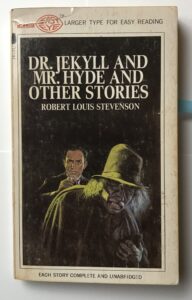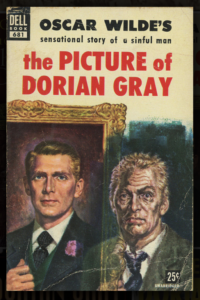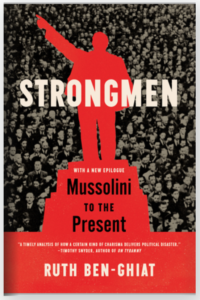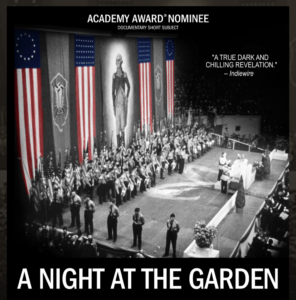Dr Jekyll and Mr Hyde

Here are my thoughts upon rereading Dr Jekyll and Mr Hyde by Robert Louis Stevenson, published in 1886.
As the culmination of spooky season crept toward us, I wanted to reread this gothic classic. It’s been so long since I first read it that I had very little memory of the story or its structure. What I did remember, vividly, was Henry Jekyll waking up in his bed and seeing that his hand was that of Edward Hyde and feeling horrified.
Even at that long ago reading, I was struck by the impression that Stevenson could be writing about a gay person with internalized homophobia. Clearly, he was intending a tale of good and evil. But rereading the story, I could see that the struggle Dr Jekyll faced could easily be that of a person ashamed of acts of masturbation or it could be Stephen Dedalus contending with his guilt over visiting prostitutes. Or it could be any member of the LGBTQ+ community struggling with distress about their natural feelings of sexual attraction or gender identity—feelings that do not align with “mainstream” culture.

Good vs Evil
The “good vs. evil” theme brought to mind these two stories:
In Plato’s Phaedrus, the human soul is described in terms of Reason driving a chariot pulled by a pair of horses, one white and one black:
“…the human charioteer drives his in a pair; and one of them is noble and of noble breed, and the other is ignoble and of ignoble breed; and the driving of them of necessity gives a great deal of trouble to him.” —from Plato’s Phaedrus, the Chariot Allegory (Jowett English translation, 1892).
https://www.john-uebersax.com/plato/plato3.htm
There is a similar story attributed to the Cherokee or other indigenous American peoples:
“The legend is usually framed as a grandfather or elder passing wisdom to a young listener; the elder describes a battle between two wolves within one’s self, using the battle as a metaphor for inner conflict. When the listener asks which wolf wins, the grandfather answers “whichever one you feed.” —Wikipedia, “Two Wolves,”
https://en.wikipedia.org/wiki/Two_Wolves
Another thing that struck me in the story was the use of the word “professional” to describe Dr Jekyll’s hands: “Now, the hand of Henry Jekyll…was professional in shape and size; it was large, firm, white and comely. But the hand which I now saw…lying half shut on the bed-clothes, was lean, corded, knuckly, of a dusky pallor, and thickly shaded with a swart growth of hair. It was the hand of Edward Hyde.”
There is a definite element of class consciousness here. Working men would have hands that bore the strains of their livelihoods. The “lower classes” were often associated with degradation, licentiousness, even criminality (thought in early eugenics to be hereditary).
The Picture of Dorian Gray

Dorian Gray vintage cover
Reading Stevenson’s story I couldn’t help thinking of Oscar Wilde’s The Picture of Dorian Gray published some five years later in 1891. I’m not the first to connect the two tales. If you enter “Dorian Gray and Dr Jekyll” in your search engine, you’ll find several articles discussing the two. They both depict a split between the public face of genteel virtue and the private or secret element of immorality and depravity. Dr Jekyll’s first person document describes Hyde’s activities with the words “pleasures” “undignified” “primitive” “disgrace” “disordered sensual images” “depravity” “inherently malign and villainous” “monstrous” “lust of evil.”
Wilde writes of Dorian, “The worship of the senses has often…been decried, men feeling a natural instinct of terror about passions and sensations that seem stronger than themselves, and that they are conscious of sharing with the less highly organized forms of existence. But it appeared to Dorian Gray that the true nature of the senses had never been understood, and that they had remained savage and animal merely because the world had sought to starve them into submission…” He continues, “…he was haunted by a feeling of loss. So much had been surrendered! And to such little purpose! There had been mad willful rejections, monstrous forms of self torture and self-denial, whose origin was fear, and whose result was a degradation infinitely more terrible than that fancied degradation from which in their ignorance, they had sought to escape….there was to be…a new Hedonism that was to recreate life, and to save it from that harsh, uncomely puritanism that is having, in our own day, its curious revival….it was never to accept any theory or system that would involve the sacrifice of any mode of passionate experience.” (Dr Freud would find some areas of agreement!)
Stevenson seems to sense a positive aspect to Edward Hyde’s experience. Jekyll writes, “Yes, I preferred the elderly and discontented doctor, surrounded by friends, and cherishing honest hopes; and bade a resolute farewell to the liberty, the comparative youth, the light step, leaping pulses and secret pleasures, that I had enjoyed in the disguise of Hyde.” He speaks of Hyde “struggling after freedom.” Hyde was “younger.” “I felt younger, lighter, happier in body; within I was conscious of a heady recklessness…an unknown but not an innocent freedom of the soul.”
“And yet when I looked upon that ugly idol in the glass, I was conscious of no repugnance, rather of a leap of welcome. This, too, was myself. It seemed natural and human. In my eyes it bore a livelier image of the spirit, it seemed more express and single, than the imperfect and divided countenance I had been hitherto accustomed to call mine.”
Stevenson acknowledges a positive side to the enlivening aspect of sensuality. Surely, when LGBTQ+ people begin to accept their true feelings, they feel a sense of liberty, natural and human, a livelier image of the spirit.
Wilde’s view is an evolution from a strangling puritanism, to an acceptance of one’s erotic nature.
However, both Stevenson and Wilde accept that sensuality and licentiousness can go too far. Later, when Jekyll can no longer control the appearance of Hyde with chemicals, he understands that Hyde is stronger than ever: “…the lower side of me, so long indulged, so recently chained down, began to growl for license.”
“But I had voluntarily stripped myself of all those balancing instincts by which even the worst of us continues to walk with some degree of steadiness among temptations; and in my case, to be tempted, however slightly, was to fall.”
And there is Oscar Wilde’s famous quip: “I can resist every thing but temptation.” Dorian’s excesses were temptations he could not resist.
The black horse has taken over; the destructive wolf has been too well fed.
The deformity and decay of Edward Hyde and the loathsome, cunning, and bloody portrait of Dorian Gray, were incontrovertible evidence of that truth.
~ ~ ~
Ruth Ben-Ghiat quotation

Professor of History Ruth Ben-Ghiat (author of Strongmen: Mussolini to the Present (2020):
“And I want to say something about the use of profanity and the crudeness of all of these remarks at the [Trump] Madison Square Garden rally, which of course was the site of the American Nazi rally, because we think about authoritarianism as imposing controls on people and silencing people, and it certainly does that. But it also is designed, from fascism forward, to make people become their worst selves, to give them permission to be as violent and unrestrained as possible. And so, deregulation, just as, you know, Project 2025 wants to deregulate environmental protections and food safety things, following what happened during the Trump presidency, there’s also a deregulation of inhibitions, of morals, and so that you will be not — less bothered when the violence starts. You will turn the other cheek, or you will participate in it. And this kind of profanity, you know, at women, the misogyny, anti-Black statements, calling Latinos garbage, it’s not only a tradition of dehumanization that starts with fascism and goes through authoritarian movements up to our day, it’s also designed to make people feel, the foot soldiers of MAGA, that there are no restraints, there are no controls, and everything will be accepted as long as it is in the service of targeting the enemy within.” from Democracy Now!, 10-29-2024
https://www.democracynow.org/2024/10/29/2024_election_fascism_authoritarianism
~ ~ ~
Fascist Rally, then and now

A Night at the Garden, a short film directed by Marshall Curry, 7 minutes.
“In 1939, 20,000 Americans held a pro-Nazi rally in New York’s Madison Square Garden — an event largely forgotten from American history.
A NIGHT AT THE GARDEN, made entirely from archival fragments filmed that night, transports audiences into this disturbing gathering and shines a light on the enduring power of demagoguery and antisemitism.”
Web link below:
***
Recent Comments